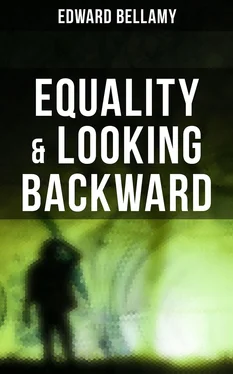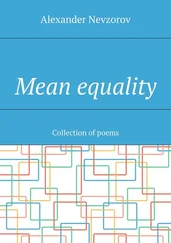“I do not at once see how that follows,” I replied.
“It is very simple,” said Dr. Leete. “When innumerable different and independent persons produced the various things needful to life and comfort, endless exchanges between individuals were requisite in order that they might supply themselves with what they desired. These exchanges constituted trade, and money was essential as their medium. But as soon as the nation became the sole producer of all sorts of commodities, there was no need of exchanges between individuals that they might get what they required. Everything was procurable from one source, and nothing could be procured anywhere else. A system of direct distribution from the national storehouses took the place of trade, and for this money was unnecessary.”
“How is this distribution managed?” I asked.
“On the simplest possible plan,” replied Dr. Leete. “A credit corresponding to his share of the annual product of the nation is given to every citizen on the public books at the beginning of each year, and a credit card issued him with which he procures at the public storehouses, found in every community, whatever he desires whenever he desires it. This arrangement, you will see, totally obviates the necessity for business transactions of any sort between individuals and consumers. Perhaps you would like to see what our credit cards are like.
“You observe,” he pursued as I was curiously examining the piece of pasteboard he gave me, “that this card is issued for a certain number of dollars. We have kept the old word, but not the substance. The term, as we use it, answers to no real thing, but merely serves as an algebraical symbol for comparing the values of products with one another. For this purpose they are all priced in dollars and cents, just as in your day. The value of what I procure on this card is checked off by the clerk, who pricks out of these tiers of squares the price of what I order.”
“If you wanted to buy something of your neighbor, could you transfer part of your credit to him as consideration?” I inquired.
“In the first place,” replied Dr. Leete, “our neighbors have nothing to sell us, but in any event our credit would not be transferable, being strictly personal. Before the nation could even think of honoring any such transfer as you speak of, it would be bound to inquire into all the circumstances of the transaction, so as to be able to guarantee its absolute equity. It would have been reason enough, had there been no other, for abolishing money, that its possession was no indication of rightful title to it. In the hands of the man who had stolen it or murdered for it, it was as good as in those which had earned it by industry. People nowadays interchange gifts and favors out of friendship, but buying and selling is considered absolutely inconsistent with the mutual benevolence and disinterestedness which should prevail between citizens and the sense of community of interest which supports our social system. According to our ideas, buying and selling is essentially anti-social in all its tendencies. It is an education in self-seeking at the expense of others, and no society whose citizens are trained in such a school can possibly rise above a very low grade of civilization.”
“What if you have to spend more than your card in any one year?” I asked.
“The provision is so ample that we are more likely not to spend it all,” replied Dr. Leete. “But if extraordinary expenses should exhaust it, we can obtain a limited advance on the next year’s credit, though this practice is not encouraged, and a heavy discount is charged to check it. Of course if a man showed himself a reckless spendthrift he would receive his allowance monthly or weekly instead of yearly, or if necessary not be permitted to handle it all.”
“If you don’t spend your allowance, I suppose it accumulates?”
“That is also permitted to a certain extent when a special outlay is anticipated. But unless notice to the contrary is given, it is presumed that the citizen who does not fully expend his credit did not have occasion to do so, and the balance is turned into the general surplus.”
“Such a system does not encourage saving habits on the part of citizens,” I said.
“It is not intended to,” was the reply. “The nation is rich, and does not wish the people to deprive themselves of any good thing. In your day, men were bound to lay up goods and money against coming failure of the means of support and for their children. This necessity made parsimony a virtue. But now it would have no such laudable object, and, having lost its utility, it has ceased to be regarded as a virtue. No man any more has any care for the morrow, either for himself or his children, for the nation guarantees the nurture, education, and comfortable maintenance of every citizen from the cradle to the grave.”
“That is a sweeping guarantee!” I said. “What certainty can there be that the value of a man’s labor will recompense the nation for its outlay on him? On the whole, society may be able to support all its members, but some must earn less than enough for their support, and others more; and that brings us back once more to the wages question, on which you have hitherto said nothing. It was at just this point, if you remember, that our talk ended last evening; and I say again, as I did then, that here I should suppose a national industrial system like yours would find its main difficulty. How, I ask once more, can you adjust satisfactorily the comparative wages or remuneration of the multitude of avocations, so unlike and so incommensurable, which are necessary for the service of society? In our day the market rate determined the price of labor of all sorts, as well as of goods. The employer paid as little as he could, and the worker got as much. It was not a pretty system ethically, I admit; but it did, at least, furnish us a rough and ready formula for settling a question which must be settled ten thousand times a day if the world was ever going to get forward. There seemed to us no other practicable way of doing it.”
“Yes,” replied Dr. Leete, “it was the only practicable way under a system which made the interests of every individual antagonistic to those of every other; but it would have been a pity if humanity could never have devised a better plan, for yours was simply the application to the mutual relations of men of the devil’s maxim, ‘Your necessity is my opportunity.’ The reward of any service depended not upon its difficulty, danger, or hardship, for throughout the world it seems that the most perilous, severe, and repulsive labor was done by the worst paid classes; but solely upon the strait of those who needed the service.”
“All that is conceded,” I said. “But, with all its defects, the plan of settling prices by the market rate was a practical plan; and I cannot conceive what satisfactory substitute you can have devised for it. The government being the only possible employer, there is of course no labor market or market rate. Wages of all sorts must be arbitrarily fixed by the government. I cannot imagine a more complex and delicate function than that must be, or one, however performed, more certain to breed universal dissatisfaction.”
“I beg your pardon,” replied Dr. Leete, “but I think you exaggerate the difficulty. Suppose a board of fairly sensible men were charged with settling the wages for all sorts of trades under a system which, like ours, guaranteed employment to all, while permitting the choice of avocations. Don’t you see that, however unsatisfactory the first adjustment might be, the mistakes would soon correct themselves? The favored trades would have too many volunteers, and those discriminated against would lack them till the errors were set right. But this is aside from the purpose, for, though this plan would, I fancy, be practicable enough, it is no part of our system.”
Читать дальше










